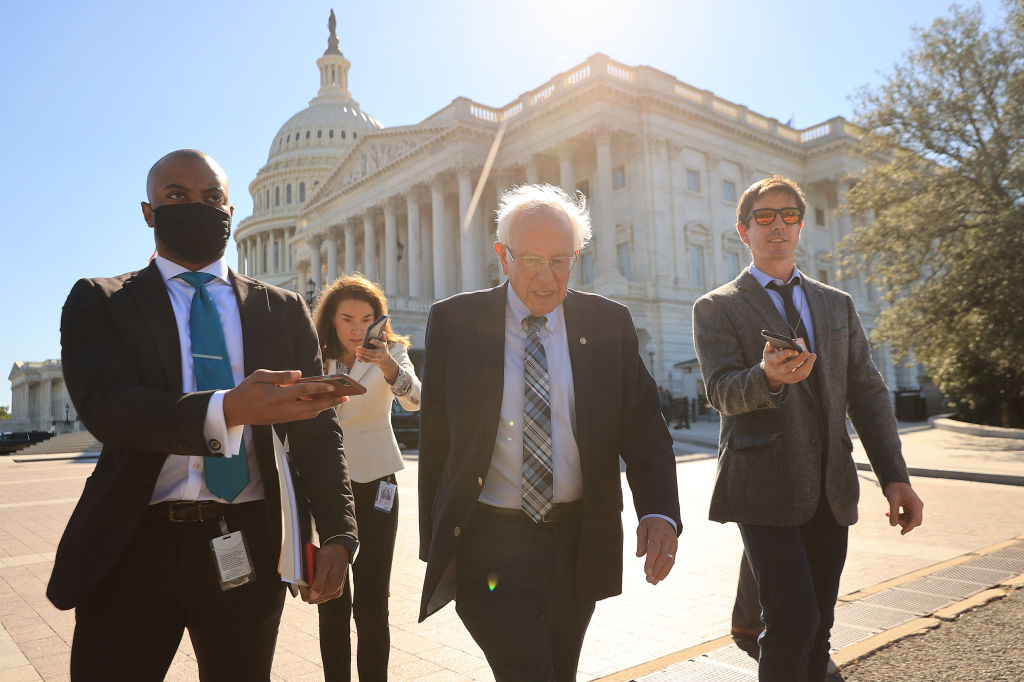Support justice-driven, accurate and transparent news — make a quick donation to Truthout today!
As President Joe Biden and Democrats in Congress continue negotiations over the White House’s Build Back Better agenda following progressive lawmakers’ refusal to accept right-wing Democrats’ efforts to tank a $3.5 trillion investment in working families, Sen. Bernie Sanders late Monday pointed out a key obstacle to passing the spending package: the corporate media.
The senator, who as the Senate Budget Committee chairman is a key architect of the Build Back Better Act that Democrats hope to pass through the filibuster-proof reconciliation process, posted a video featuring archival footage of several speeches he’s given during his political career on the harm corporate media outlets do to political discourse in the United States. “There’s a big disconnect between the corporate media and working people,” Sanders (I-Vt.) tweeted.
There's a big disconnect between the corporate media and working people. Across America, people work 50-60 hours a week, can't afford child care, have no health care, and they turn on the TV and the media says 'everything is great!' because corporations are making record profits. pic.twitter.com/O7JBijh3cU
— Bernie Sanders (@BernieSanders) October 4, 2021
The video included Sanders’ past criticisms of major news outlets that are “owned by big money” and heavily invested in burying the stories of those who would benefit most from the passage of the reconciliation bill, which progressives are demanding if they are to support the president’s smaller physical infrastructure package.
“When we talk about big money controlling this country, it’s not only the direct political process but it’s how we even learn about what’s going on in this country,” Sanders said in one of the video clips. “In a democratic society, what media has to do is reflect your lives, your pains, your problems, your hopes.”
Sanders’ comments on social media followed weeks of coverage of the opposition to the Build Back Better Act by right-wing Democratic Sens. Joe Manchin of West Virginia and Kyrsten Sinema of Arizona, who have claimed the 10-year investment — which amounts to roughly $1,000 in government spending per person, per year — is too expensive.
As observers including journalist and activist Parker Molloy tweeted Tuesday, the corporate media has helped solidify that narrative.
https://twitter.com/ParkerMolloy/status/1445371304706813952?ref_src=twsrc%5Etfw%7Ctwcamp%5Etweetembed%7Ctwterm%5E1445371304706813952%7Ctwgr%5E%7Ctwcon%5Es1_&ref_url=https%3A%2F%2Fwww.commondreams.org%2Fnews%2F2021%2F10%2F05%2Fbernie-sanders-explains-why-most-media-coverage-reconciliation-fight-corporate-con
As Sanders said in another clip in the compilation he posted, critics accused the political media in recent weeks of treating those fighting for and against the president’s agenda “like the Boston Celtics or the New York Yankees.”
“Isn’t it interesting, do you think he’s going to win?” Sanders said in the archival video, imitating news anchors who choose to portray party infighting as exciting melodrama rather than as a clear view into the policy priorities of elected officials.
“There’s a ton of important and lifesaving stuff in the ‘$3.5 trillion’ reconciliation bill but the average media consumer would have next to no idea about [what] the human stakes are by reading the horserace ‘left vs. moderate’ psychodrama coverage,” tweeted Adam Johnson, co-host of the media criticism podcast “Citations Needed.”
Maybe, if youre lucky, expanded dental, vision and hearing coverage, universal pre-K, expanding Medicare, 2 years of free community college, will be brought up in paragraph 7. The framing is all about jockeying between political forces, no sense of the human impact on poverty
— Adam Johnson (@adamjohnsonCHI) October 5, 2021
As Sanders and other progressives have repeatedly said, the spending package is aimed at addressing the “long-neglected” needs of everyday Americans by expanding the Child Tax Credit included in the coronavirus relief package passed earlier this year — giving millions of families thousands of dollars per year to help with the cost of child care — lowering drug prices and including dental, vision, and hearing care in Medicare coverage; ending “the international disgrace of the United States being the only major country on earth not to provide paid family and medical leave,” and taking other steps to help working people.
Despite the corporate media’s focus on the cost of the package and the stated claims of concern by Sinema and Manchin, said writer and advocate Rebecca Nagle, “what’s in the reconciliation package is [Biden’s] agenda. It’s also the party’s agenda.”
“The media framing the fight over the reconciliation package as between ‘moderate’ and ‘progressive’ Democrats is a choice,” said Nagle.
Press freedom is under attack
As Trump cracks down on political speech, independent media is increasingly necessary.
Truthout produces reporting you won’t see in the mainstream: journalism from the frontlines of global conflict, interviews with grassroots movement leaders, high-quality legal analysis and more.
Our work is possible thanks to reader support. Help Truthout catalyze change and social justice — make a tax-deductible monthly or one-time donation today.
